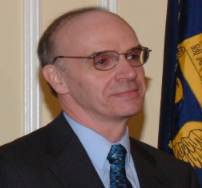- About Archives
- About SAA
- Careers
- Education
- Publications
- Advocacy
- Membership
 Professional Experience: Guest Scientist, Information Technology Laboratory, National Institute of Standards and Technology, 2011‒ ; Director, Center for Advanced Systems and Technology, NARA, 2009‒2010; Director, Electronic Records Archives Program, NARA, 1998‒2009; Deputy Director, Modern Records Programs, NARA, 1996‒1998; Director, Records Management Task Force, Department of Defense, 1995; Director, Center for Electronic Records, NARA, 1988‒1995; Chief, Records Management Branch, National Institutes of Health, 1978‒1988; Archivist, Machine Readable Archives Division, NARA, 1975‒1978.
Professional Experience: Guest Scientist, Information Technology Laboratory, National Institute of Standards and Technology, 2011‒ ; Director, Center for Advanced Systems and Technology, NARA, 2009‒2010; Director, Electronic Records Archives Program, NARA, 1998‒2009; Deputy Director, Modern Records Programs, NARA, 1996‒1998; Director, Records Management Task Force, Department of Defense, 1995; Director, Center for Electronic Records, NARA, 1988‒1995; Chief, Records Management Branch, National Institutes of Health, 1978‒1988; Archivist, Machine Readable Archives Division, NARA, 1975‒1978.
Education: PhD, University of Pennsylvania; BA, Fordham University.
Professional Activities: Society of American Archivists: Program Committee, 2011; Co-chair, Committee on Education, 1995; Standards Committee, 1992‒1993; and Committee on Automated Records and Techniques,1989‒2000. Emmett Leahy Award Committee: 2009‒ . Motion Pictures Expert Group, Working Group on Multimedia Preservation, 2011‒ . ISO/IEC Joint Technical Committee 1, Information Technology: Working Group on the Digital Preservation Interoperability Framework, 2010‒ . InterPARES Project, 1999‒2011, Chair Preservation Task Force, 1999‒2001. International Council on Archives, secretary, Committee on Electronic Records, 1990‒1994. Other: advisor and steering committee member to several national and state archives and numerous digital preservation projects across the U.S. and internationally.
Publications: “Digital Preservation: Communicating Across Cyberspace and Time,” Association for Computing Machinery, Proceedings of the First International Digital Preservation Interoperability Framework Symposium, 2011. “Building a Future for Our Times: the Electronic Records Archives of the National Archives and Records Administration, U.S.,” East Asian Archives, 2008. “If you build it, will it fly? Criteria for Success in a Digital Repository,” Journal of Digital Information, 2007. With Luciana Duranti, “The Concept of Record in Interactive, Experiential and Dynamic Environments: The View of InterPARES,” Archival Science, 2006. “Overview of Technological Approaches to Digital Preservation and Challenges in Coming Years,” Council on Library and Information Science, The State of Digital Preservation: An International Perspective, 2002. With Reagan Moore and Chaitan Baru, “Persistent Object Preservation: Advanced Computing Infrastructure for Digital Preservation,” Proceedings of the DLM Forum on Electronic Records, 1999. “Rupture ou continuité: l’évaluation des archives au seuil de l’époque numérique,” AAQ Archives, 1999‒2000. And 30 others.
Presentations: More than 150.
Awards: Archivist of the United States, Lifetime Achievement Award, 2008; Emmett Leahy Award, 2008; Federal Computer Week, Federal 100 Award, 2004; with others: Mid-Atlantic Regional Archives Conference, Arline Custer Memorial Prize, 2004; With James McKan: NARA, Special Achievement Award for building and sustaining a diverse, high quality workforce, 2004; with others: NARA, Special Achievement Award for successful development of the Access to Archival Databases resource, 2003; Society of American Archivists, Fellow, 2000.
* * *
Questions posed by the Nominating Committee: Taking into account SAA’s strategic priorities, in which specific initiatives would you take a leadership role? How would you go about implementing these given the competing priorities of the organization while remaining responsive to members and their needs?
Forty years of experience with IT, including computer programing; records management; archival work; systems analysis and development; standards development; teaching; publishing; and outreach to professional societies in various fields, federal, state, and foreign governments, intergovernmental organizations, private corporations, and trade groups; and collaborating on numerous research projects, have given me a very broad and deep understanding of the field and the issues it poses, and will enable me to take a leading role on Council in this area.
The SAA’s strategic priority on technology is critical to archivists and the institutions they serve. SAA’s leadership in the area of information technology needs to be two pronged: one, to enable the profession to appreciate fully the challenges posed by the technology; and two, to help professionals develop, maintain and expand their ability to respond to these challenges. This is especially difficult because information technology is not only a moving target: it evolves and mutates rapidly. This difficulty is compounded by the creativity of individuals, organizations, and society at large in coming up with new ways to use the technology. The profession needs to develop not only concepts and techniques for addressing technological challenges, but indeed a mindset that anticipates open-ended and unpredictable change. Archivists can’t, and don’t need to, be technical experts. They need to be able to exercise sound technical judgment. Only technical experts can produce solutions, but only persons who understand real world needs, constraints, and aims can judge whether a solution is good. SAA can and should be both a major venue and a catalyst for the development of technical judgment.